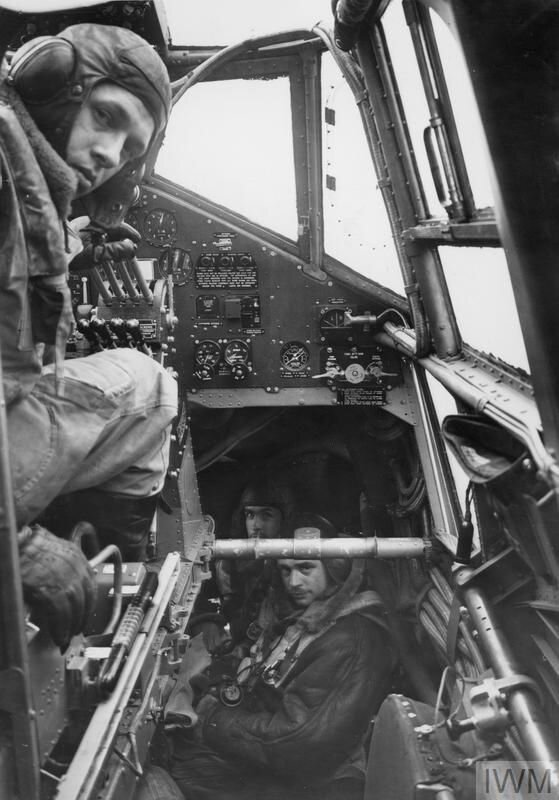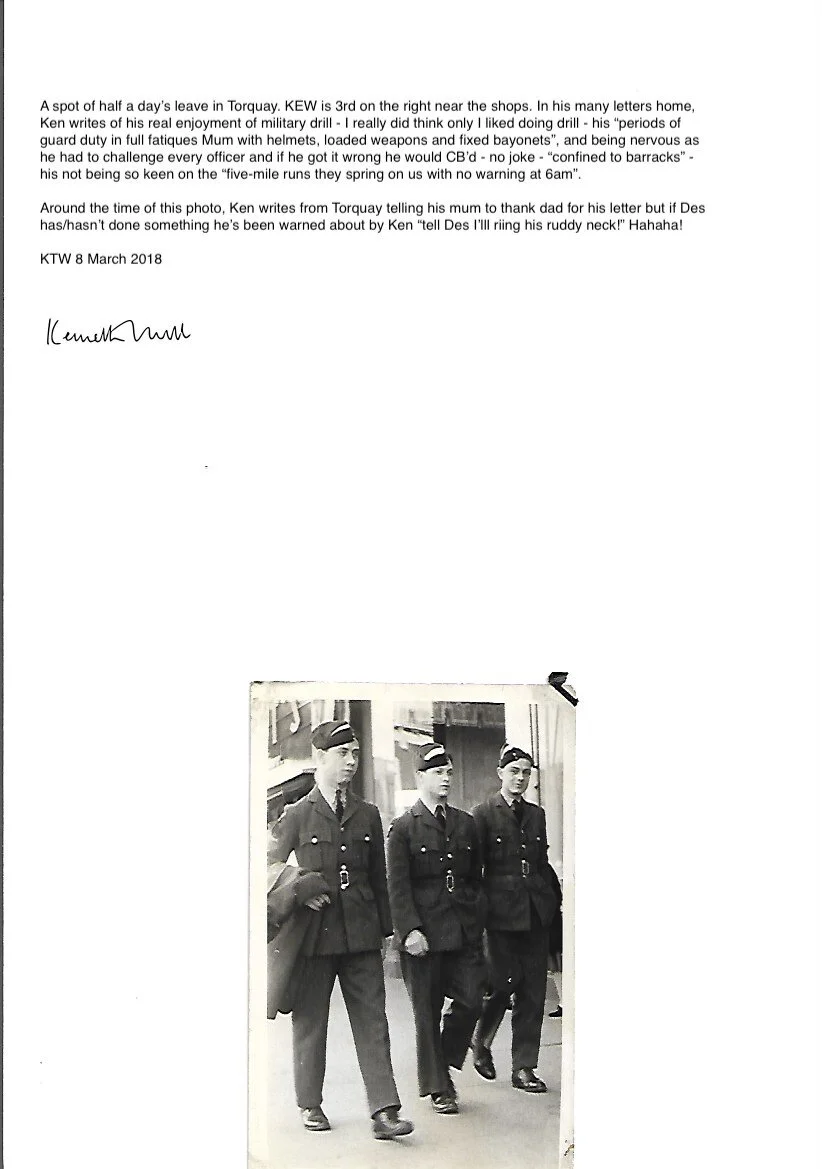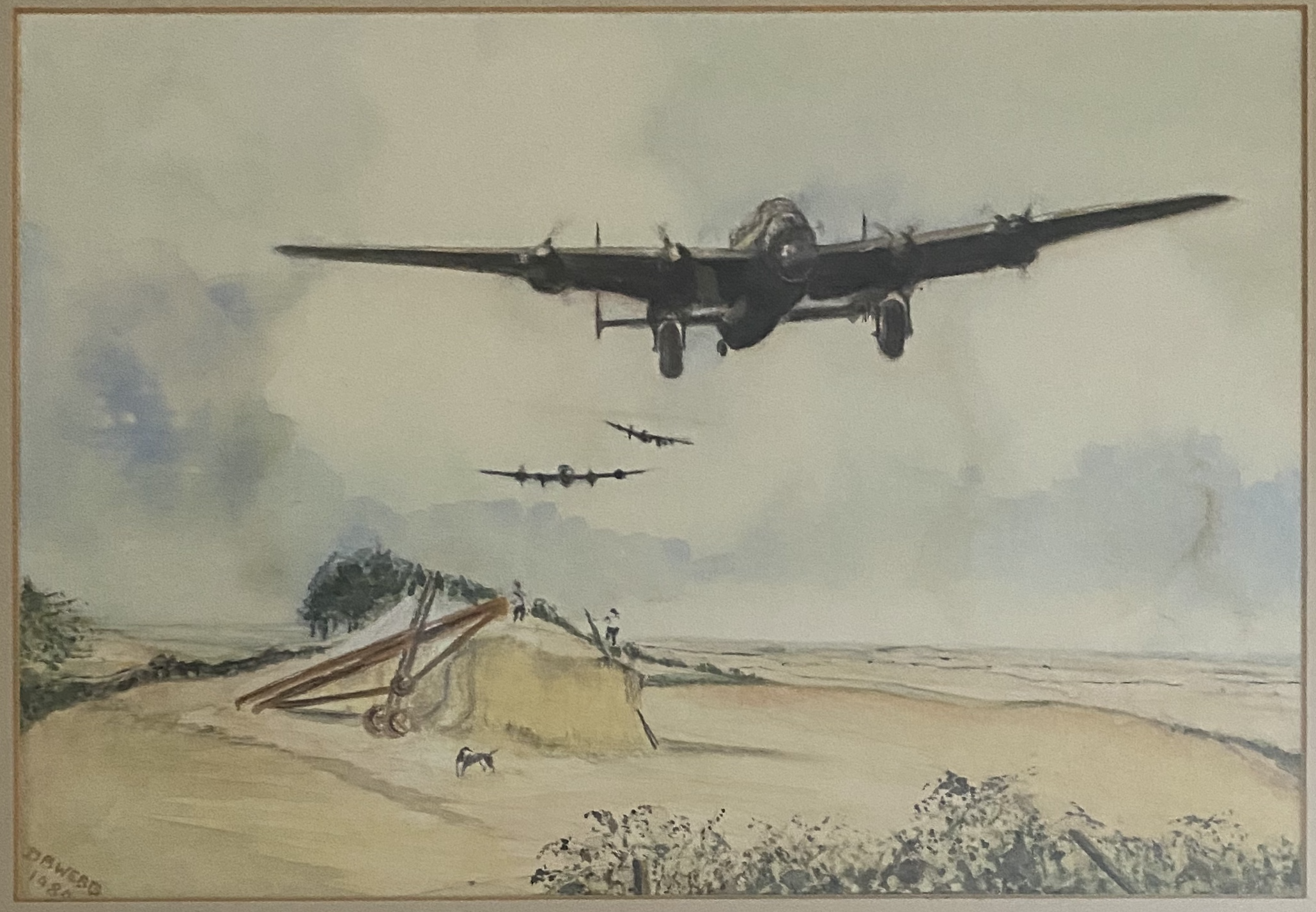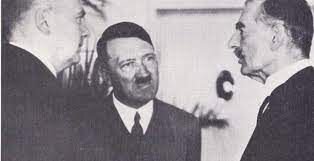City to Shire Chapter 31 ~ Life is Good ~ Our Family's Motto (Revised Edition)

Windsor Street Days
Chapter 31
Life is Good ~ Our Family’s Motto
Introduction
The history of the Royal Air Force, in its one hundred and fifth year, is colossal. If I take it back a further six years to 1912 with the formation of the Air Branch of the Army, Warranted by King George V as His Majesty’s Royal Flying Corps, then it is one hundred and eleven years.
Method and accuracy are the hallmarks of research, and research is both painstaking, and demanding. To attempt to write that history is way beyond my capability. This, then, is a personal task, for my own enjoyment, and because I want to build the foundation for the next generation of my family to have; to one day refer back to. It is quite possible that there will be no interest. That does not matter. What matters is what interests me in these years that represent that last circuit when the next turn will be into a final and, hopefully, graceful approach and touch down.
Archiving is a pastime that I enjoy; my notes and papers are for my own benefit. Should these notes be found, and then become useful, great! If they do not, again, it matters not; because the purpose of the notes is to satisfy my own research and enquiry into my family and to my ancestors.
Part I
In any period of history, the bread-winning generation is not interested in obscure events from the past, no matter how momentous. We live in the moment. We are unaware of the ‘timeline of history’. We do not comprehend the connection of past events with current events, or more importantly, we do not connect present with past generations. We see no reason to connect. Our world is what matters.
I notice this more the older I am. Gen Z has the right to use the footpath (sidewalk) and is rattled with impatience when my generation is in the way, even more so, if I fail to give way even though I have the right of way. I am of no consequence.
In our teens, twenties and thirties, we are busily constructing our lives and our families, correcting mistakes and making progress, building, demolishing, rebuilding, creating anew.
In our fifties a curious thing happens, there seems to be a sea-change. A pendulum comes into view as, we realise, it begins its ominous scythe-like return. That adjective is deliberate and I mean to emphasise its sharpness. [vi]
What? What is this? A timeline?
And look! Time seems to accelerate, and with it, an increasing desire to “look back from whence I came.”
At sixty, delving into archives to look at ancestors of the same age, is a whole new ball game.
Suddenly, people, situations, documents and photographs obtain clarity and resonance that bring the past to life.
In short, with time’s passage, we gain both perspective on the past and the past’s perspective. This last is very important.
Why so?
Scythe-like
In our fifties a curious thing happens, there seems to be a sea-change. A pendulum comes into view as, we realise, it begins its ominous scythe-like return. That adjective is deliberate and I mean to emphasise its sharpness…
Part II
Add to this awareness the books and research written along any point of that timeline - this ancient milestone in our mind’s eye - and suddenly, we see a period in history through the eyes and perspectives of the people of that time and of whom we have now grown to know - our ancestors.
Some of them we now feel, genuinely, that we know them. We understand them. In a sense that we even feel that we have met them.
Half a century ago, such thinking would be put down to craziness or silliness. Today, the reality of DNA severely admonishes. We are reminded that we are akin to a flower, bursting forth in the morning in all its glory and beauty, but by that very same evening, gone. [vii]
///When artefacts belonging to these ancestors are discovered in some box, the perspectives open out into dimensions. We see a whole new world, as real to us as our present world. Suddenly, ‘oh that’s in the olden days’ rings hollow, as we face the fact that our very real world shall, one day, and for a time - and us with it - be neatly packed away in that dusty old box ‘the olden days’ and, hoping on a wing and a prayer, that our family and descendants aren’t philistines, whose desire is to toss things on heaps or - in this present world - ‘now, what can I get for this on eBay?’ Looking on through that flimsiest of veils, we sigh relief : Goodness! That was close!! I write this with conviction. I am very aware that apart from my nieces, no one in the family reads books. Certainly, this is not a family that deigns to read fiction. Being a writer, this tries my patience. Then again, the engineers and gardeners within this clan will express similar impatience with people like me.
But I do, with the wisdom of years, caution thus : in this family there is a well known dictum ~ Use it or lose it.
What this family has not cottoned onto is that this dictum goes across the board. Without use, each succeeding generation waters down the previous generation’s achievements and sacrifices until absence stares one in the face.
Every generation witnesses the loss of something at the expense of progress in some skill, some field, some talent. This hits us hard when very old manuals are found, and enterprising individuals who understand this all too well, set out to learn afresh the lost skill.
III
This, then, is my approach in researching my family’s history in the Royal Air Force and in RAF Coastal Command and RAF Bomber Command and which must, therefore, include the Royal Canadian Air Force because of my mother’s brother, who was so proud to be seconded from the RAF to 405 (City of Vancouver) Squadron RCAF as a Pathfinder Flight-Engineer.
This bond between the different air forces is summed up perfectly by General Dixon USAF in his Foreword to Flight Lieutenant Murray Peden’s masterpiece A Thousand Shall Fall. It is reproduced in RAF No 4. Murray Peden has done much to enable me to obtain a grasp of my uncles and their crews, the Webb Crew and the Payne Crew, fourteen aircrew in total, one in a Handley Page Halifax DK165 MP-E, the other in an Avro Lancaster PB402 LQ-M, seven in each, with only the mid-upper gunner surviving from the Webb Crew. More about this later.
IV
Because of the good fortune of owning this website, the heat is off. I do not need to work under the pressure of a publisher’s deadline. I set my own pace. And because of my own service, that ‘wing and a prayer’ comes back to mind : in the form of hoping that my nephews and nieces, between them - Chris, Suzie, Caroline, Sam, Jack and Finn - will, in due course, keep this website operational. Fingers crossed, hey!
However, it is important to say little or nothing about this, for people will always measure one’s efforts by their own rule. They will see things from their perspective, not mine. And I’m at that age where, at last, I can accurately spot that sudden glazed expression, that search for a means of escape.
Episode Two
I
I love history. I love reading military history. I love to analyse legal and ancient documents, abstracts of title, scrolls, leather parchment, manuscript, maps and military documents. This not only derives from history being my favourite subject at school, but also thirty years in the legal profession, the formative years being pre word-processor age - let alone computer age - where we dealt with legal documents written a hundred or more years earlier, often twice that, and the twin skills of reading and writing abstracts of title. That skill has, by and large, gone. I remember marvelling at the legal secretary whose skill included typing in abstract. And this interest carried into military documents.
Working both in the, then, police force and the Royal Air Force, both using near identical administrative systems, means that what I took for granted I now absolutely relish, when I am given old staff orders, temporary and permanent general orders, briefing papers, operations orders, TS papers (now declassified).
The dates take me to the timeline.
The timeline opens up a vision of the RAF Station (today’s base), the Adjutant dictating or drafting the station’s Battle Order for the Station Commander, who in turn is looking at his order of battle that covers all the squadrons on his station, their state of preparedness, the possibility that a message has come down from on high - ‘maximum effort’ - and so discussions with fellow station and group commanders in drafting in the crews undergoing training in both the OCUs and HCUs [i]; the meteorological reports which always finds me thinking, if only they knew then what we know now about why those weather patterns at different altitudes behave in the way they do!
We take for granted the weather forecasts, overlooking that meteorology, “that branch of science concerned with the processes and phenomena of the atmosphere, especially as a means of forecasting the weather”, is also constantly evolving.
II
Revisionist history presents a problem. It is not new.
Every century will wish to revise its recall and interpretation of events. That is understandable. But when we revise history in order to sanitise the past, then it becomes a serious matter. When we attempt to sanitise the past, we deny the truth, we become willing accomplices to the occupation of the liar.
Revision and Conspiracy are so, so often, co-conspirators. Any and all their work is nothing more than ‘theory’, but very attractive to the man on the Clapham Omnibus. [ii]
One might say that this is good. It is, if it is an accurate updating of existing facts as a result of new facts becoming known.
Here, I define facts as ‘some new factor of which there is incontrovertible evidence as to its accuracy and bona fides.’
It is not, if the foundation of that ‘new’ fact is the cult of popular revision of history through the TV docudrama re-enactments, and the desire to tilt history to one’s preferred interpretation; to create conversations that the watching public are fooled into accepting as gospel, when in fact it is a conversation merely in the head of the scriptwriter.
If it sanitises history in favour of, say, white supremacy on the one hand, or, say, in favour of black subjugation on the other, then it is falling far short of fact. I was disappointed with the organisers of the BLM Movement in somehow managing to include Marshal of the Royal Air Force Sir Arthur ‘Bomber’ Harris on their list of statues to be brought down, and whose identity is to be erased.
Why so?
Because, they insist, Sir Arthur Harris is deemed a white colonial supremacist from former Rhodesia (now Zimbabwe). His place along the timeline is not made any easier if I take cognisance of an author about the Dresden Raid who was a chap that deserved my ear in a recently watched documentary, until said chap spoke of Harris’s personal spite and cruelty; the man’s exposition let him down. This did not accord with the Sir Arthur Harris I met and spoke with at length in 1982 when I was still in service.
As I write elsewhere:
On the 19 September 1982 I had the honour and privilege to meet Marshal of the Royal Air Force Sir Arthur ‘Bomber’ Harris at a Reception at the Cheltenham Royal Air Force Association, after attending the unveiling of a plaque by Sir Arthur Harris, marking his birthplace in 3 Queens Parade Cheltenham. As a young serving flight lieutenant I remember chatting for several minutes with him over a coffee, and in particular, Sir Arthur Harris's interest in the loss of my two uncles.
Both of us in uniform, an extraordinary moment then, priceless now, for I also remember his quiet fortitude and gentleness and at the same time his bearing as the Commander who had carried the greatest weight upon his shoulders. I remember at the time thinking that it had always been right to carry through the government's policy and I remember too Sir Arthur's slight shrug of the shoulders when I touched upon the rough treatment Bomber Command received as soon as operations ceased. I remember his wry smile too, and I am even more proud today that my two uncles had served under his command.
III
This attempt to tilt history towards one’s own preferred thinking is often very subtle:
the wartime memorial inscription in Plymouth, typed afresh on the internet, but with one or two words quietly moved around to give a different, more politically correct emphasis
in speeches, the not-so-subtle editing out of tracts that would otherwise prove beyond doubt the revisionist’s warped perspective.
All of which has been called out and laid bare for all of us to see by the Equalities Minister Mrs Olukemi Olufunto Badenoch neé Adegoke, MP for Saffron Walden in Mrs Badenoch’s Statement to the House of Commons on October 21, 2020. This statement can be found in the short YouTube clip (8.30 minutes) in the website’s Gallery of Videos.
As Lieutenant-General Ira C. Eaker also writes in his Foreword to A Thousand Shall Fall by Murray Peden:
With the revival of interest in the air campaigns of World War II, much ill-conceived propaganda is being written, the general tenor of which is that RAF Bomber Command under the leadership of Sir Arthur T. Harris, deliberately and without reason attacked civilians, including women and children.
General Eaker continues:
I can understand how present historians and pacifists with a pathological prejudice against warfare, even in defence of a nation and its people, can find some grounds which may be distorted to support such claims.
General Eaker makes the very point to which I found my research led me:
... the civilian who makes a weapon bears as much responsibility for warfare as the soldier who carries it into battle.
The full transcript of the foreword can be found in RAF No 3.
IV
I am interested in the Royal Air Force because of my family’s RAF service history, during the Second World War and immediately post war through the lives of three Uncles - Ken Webb, Harry Marshall and Frank Marshall - all combining to point me towards the Air Training Corps in 1968 at age 15, becoming a glider pilot a year later at RAF South Cerney [iii], and then being commissioned into the RAF Volunteer Reserve in 1974 [iv] and thence going on to command three ATC Squadrons, as well as enabling a fourth squadron to be established in Tewkesbury, before retiring in 1991.
That Harry Marshall entered the RAF Volunteer Reserve via one of those Air Training Corps squadrons was, for me, an immense privilege. On reflecting his attaining the rank of cadet sergeant before entering the RAF VR in 1942, I often sat in my office thinking that family fact through, imagining a conversation … well Harry, even though you won’t meet him, 48 years from now your nephew, as yet unborn, will take command of this squadron…
That, as I say, was me the writer using my imagination. All of us can, so easily, create something out of nothing. And there lies the greatest danger of all. There lies the difficulty of the writer of an historical docudrama. The problem is not so much with the writer, as with the reader or viewer who presumes that what they read and see in front of them, must, obviously, be the truth.
V
Surprisingly - as it is not usual with junior ranks - I was granted the courtesy title of flight lieutenant [v] for life, in recognition of my service. I am very proud of that, for at the time of retiring I was shortlisted for staff and at 38 still had much to give.
Unfortunately, ill-health had other ideas: ‘check-mate squire’. Oh well! Better change track and be quick about it.
Nevertheless, I owe a great deal to the Royal Air Force, for when things became very difficult in 2009, my military service enabled the Officers’ Association to give crucial support, something I had not sought out but was quietly steered towards.
Episode Three
I
I thus return to RAF Bomber Command which is an essential element of Windsor Street Days.
As a member of the International Bomber Command Centre in Lincoln, the Battle of Britain Memorial Flight and the RAF Pathfinders respectively, I am immensely proud of these three organisations. More recently, I have been able to join 76 Squadron Association. Thus I have my link with all those who gave up everything in order that I have my life and my freedom. This fourth link, with the famous 76 Squadron and, more importantly, my uncle’s squadron is very special.
II
This, then, is my starting point; my raison d’être. I write about RAF Bomber Command in my own way and simply for my family.
Gradually, I am pulling together existing work and which are listed below. It reminds me of glider training back in 1969.
“All Out!” and the winch op would reply “All out sir’ down a crackly line, and the winch would suddenly go taut and we’d literally thresh our way through long grass at RAF South Cerney in Gloucestershire and … …
up, up and away!
Kenneth Thomas Webb
1 May 2022
All Rights Reserved
© Kenneth Thomas Webb 2022
Footnotes
[i] Operational Conversion Units … Heavy Conversion Units
[ii] the man on the Clapham Omnibus : founded in English Law, this is a Victorian (19th Century) definition of ‘an ordinary and reasonable man’. The learned judge ruled that such a man is a reasonably educated, intelligent but nondescript person, against whom the defendant’s conduct can be measured. This definition remains a vital part of British and Commonwealth common law jurisdictions.
[iii] now Royal Corps of Transport, Duke of Gloucester Barracks, British Army
[iv] in my birth name, not my author name
[v] captain in the Army, lieutenant in the Royal Navy
[vi] scythe-like. Image is by Nihal Demirci Erenay via Unsplash
[vii] a paraphrase from memory of James 1: 10-11
Des being Desmond, Ken’s younger brother by five years and, more importantly, my Dad. Happy Families! Life goes on, don’t it!! Nothing changes.
Life is Good …. KW Senior
Yep … Life is indeed good, Uncle … Many thanks to you both … KW Junior
Ken Webb is a writer and proofreader. His website, kennwebb.com, showcases his work as a writer, blogger and podcaster, resting on his successive careers as a police officer, progressing to a junior lawyer in succession and trusts as a Fellow of the Institute of Legal Executives, a retired officer with the Royal Air Force Volunteer Reserve, and latterly, for three years, the owner and editor of two lifestyle magazines in Liverpool.
He also just handed over a successful two year chairmanship in Gloucestershire with Cheltenham Regency Probus.
Pandemic aside, he spends his time equally between his city, Liverpool, and the county of his birth, Gloucestershire.
In this fast-paced present age, proof-reading is essential. And this skill also occasionally leads to copy-editing writers’ manuscripts for submission to publishers and also student and post graduate dissertations.









